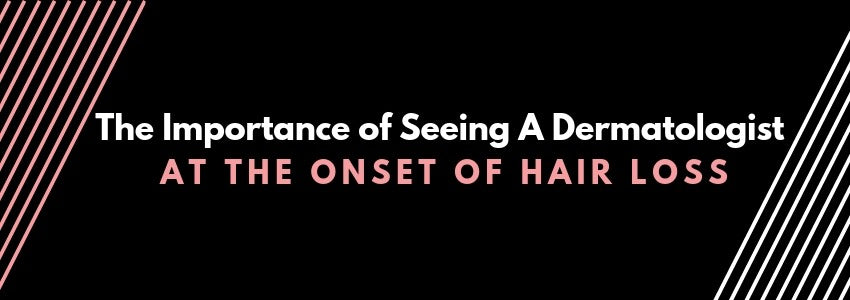What Does A Dermatologist Have To Do With Hair?
Often when people think of dermatologist's they think of skin diseases, acne and perfecting perfect skin. However,
hair loss is something they handle too. But a dermatologist is not only licensed to deal with skin issues. Dermatologists are doctors that specialize in medical
treatments and diseases and conditions of the hair, skin, and nails. A dermatologist can make judgments based on the integrity of the hair, possible
hair loss health conditions and skin or scalp issues that affect a person's hair.
A Dermatologist's Role Plays In Hair And Scalp Health
Like most people, whenever I have a hair issue, I run to google to figure out what's going on. And if Google can't help me, then I turn to my stylist to tell me what my next steps should be. Although cosmetologist focus on styling and growing healthy hair, they are not equipped to diagnose hair conditions or provide medical treatment. Dermatologist plays a crucial role in
hair and scalp health. As doctors, dermatologists are knowledgeable about issues and procedures that work for scalp health and hair growth. For severe hair conditions, a dermatologist not hairstylist is the ones to perform laser hair surgery, hair grafts or hair implants, as well as
scalp treatments and silicone injections. Dermatologist understands what makes the hair and scalp flourish as well as oddities in either one.
Why Should You See A Dermatologist At The Onset Of Hair Loss
If you suspect you're losing hair for superficial or underlying reasoning, it's best to give your hair a break
from styling and see a dermatologist and cosmetologist. Seeing a dermatologist at the first signs of hair loss can save you money, hair and time. It is imperative to see a dermatologist as early as possible so that you can get an accurate diagnosis; you could believe your hair loss to be because of a lack of moisture and dismiss it. However, your hair loss can be due to diabetes, lack of nutrients or a severe hair loss condition like patterned baldness or alopecia. Early intervention can get your hair back on track to being healthy and slow your hair loss before your hair, scalp, and psyche suffer irreversible damage. Visiting the dermatologist early on will ensure that you know the cause of your hair loss and receive adequate treatment. Do not stay in the dark about your hair's weaknesses. If you have insurance, visits to the dermatologist covered if you are experiencing pain or other more profound symptoms along
with your hair loss. Consequently, after diagnosis, your stay, as well as your treatment or medication, can be covered by your health insurance.
Recognizing Differences in Your Hair
Differences in your hair can tell you everything you need to know about your hair and bodily health. Dry and brittle hair can be a sign of low protein, oily hair can be signaling deeper health issues. Anemia or thyroid abnormalities are health issues that can be the cause of hair loss. To check for these conditions a simple blood test done at your doctor's office or a urine sample was taken. Changes to your hair and scalp might indicate health problems such as diabetes or lupus or any number of other conditions. It is essential to pay attention to the changes in your hair health.
Signs Of Hair Loss
Having a tender scalp during washing or brushing can be hinting at a bruised or weakened scalp and hint towards a more severe condition. Small bumps at the nape of the neck or edges are telltale signs of potential hair loss due to pulling and stressing of the hair follicles. Another sign of hair loss is thinning near the sides and in the middle of the hair or crown. Furthermore, be mindful of more frequent hair shedding.
Diseases or Deficiencies That Cause Hair Loss
Alopecia
Alopecia is a hair condition that results in severe hair loss and can be caused by genetics, or hair practices. There are a few different kinds of alopecia conditions. Since my mother suffers
from Alopecia, I pay extra attention to the changes in my hair's texture, thickness or length. It is crucial for me to maintain a proper diet, and converse with a stylist and dermatologist more often. And lastly, the hair loss reason that has been on the rise the past few years is Traction Alopecia or hair loss due to pulling on the hair from tight braids or hair pieces. Typically, people who consistently pull on their hair with braids, weaves, frontals or tight buns suffer from traction alopecia.
Telogen Effluvium
Telogen Effluvium is a condition associated with excessive hair shedding of hair several months after the body experiences a major stressful event. This form of hair loss is the easiest to reverse and can subside over time.
Chemical Hair Damage
This type of hair becomes
dry, and brittle and breaks off in pieces after being exposed to a chemical that is too harsh.
Genetics
Genetics plays a substantial role in how you will look, as well as what conditions or diseases you may attract. Hereditary balding or thinning is the most common cause of hair loss. The tendency to have thinned or balding hair can come from either the mother's or father's side of the family. Women with this trait develop thinning hair but do not become completely bald. The condition is called androgenetic alopecia, and it can start in the teens, twenties, or thirties. While there is no cure, medical treatments have recently become available that may help some people. One procedure involves applying a lotion, minoxidil, to the scalp twice a day. Another treatment for men is a daily pill containing finasteride; a drug that blocks the formation of the active male hormone in the hair follicle.
Pregnancy and Childbirth
Childbirth can be a significant factor in hair loss.
While pregnant, your hair enters a stage of intense growth and flaunts its best self. I loved how thick and fluffy my hair grew during my pregnancy, and luckily I kept the length, sadly I lost the fullness since I gave birth. After a woman delivers her baby, many hairs enter the resting phase of the hair cycle. For some women, a lot of the hair gained during pregnancy will fall out shortly after childbirth. Two to three months later, some women will notice large amounts of hair coming out in their brushes and combs. The shedding of extra hair can last one to six months but resolves entirely in most cases. Although, everyone does not lose the hair that hormones and the influx of vitamins have allowed flourishing over time.
Skin Conditions That Contribute To Hair Loss
Skin conditions do generally not affect
hair growth unless they spread onto the scalp or hairline. Tinea Capitis is a fungal infection that causes scales on your scalp and hair loss. Psoriasis is similar to eczema and causes thick and itchy rashes on the skin, and can lead into the scalp. The thickness of the dry patches of skin and rashes can hinder hair growth and cause temporary hair loss. If psoriasis or eczema turns out to be your case, do not attempt to scrape out the scabs. Pulling out the scaps irritate your scalp and thins out your hair. For scalp conditions that contribute to hair loss be sure to use mild shampoos like Aveeno products. Or you can use specially designed shampoos and conditioners that will treat and heal the broken and rash laden skin.
Playing Your Part To Combat Hair Loss and Unhealthy Scalp
Hair loss caused by a multitude of uncontrollable things like skin conditions, genetics, and immune deficiencies, some practices can contribute to hair loss. So here are a few tips to combat hair loss:
1. Avoiding Harsh Chemicals
Using harsh chemicals in your hair can worsen your preexisting hair or scalp conditions, and weaken your hair's chemical makeup. Chemicals like harsh and frequent dying, relaxers, perms and texturizers strip hair of natural oils and break down amino acids in the hair. Additionally, chemical processing alters the structure of your hair follicle and makes hair prone to breakage. However, these chemicals can be used on hair when used by a professional and added to the hair infrequently.
2. Axing Bad Hair Practices
Lousy hair practices can expedite how fast you lose your hair or if you lose it at all. Hair loss and breakage can occur when hair is dry, brittle, pulled on or manipulated too often. For things like traction alopecia and chemically damaged hair, hair loss is not inevitable but avoidable. Do not use too much heat, add harsh chemicals or style hair too frequently.
3. Strengthening Your Hair and Scalp from the Inside Out
The quickest and easiest way to restore your hair is to nourish your hair from the inside out. Good hair begins in the body, travels to the scalp and sprouts from the root, hair health isn't merely what you put on your scalp, it's about the building blocks of your hair. Taking vitamins, drinking water, and increasing your vitamin and mineral intake will help combat hair loss. One way to get the essentials you need for a strong hair foundation is to take vitamins daily or weekly. Vitamins such as lysine, biotin, name brand hair vitamins/ supplements such as Hair Infinity, will boost the levels of protein, amino acids, and biotin in your system, which are all nutrients needed to have healthy hair. Water is the holy grail of hair! It flushes your system, helps clear your skin and encourages blood flow to your scalp. Water will hydrate your hair from the inside out. Altering your diet to include foods that build the strength of your hair is vital to hair health. Vitamin B, fatty acids, protein, biotin, and zinc will encourage hair growth and decrease the chances of hair loss and found in everyday meals. Foods that are good for the hair include fish, nuts, eggs, beans and leafy vegetables.
4. Establishing A Solid Hair Care Regimen
A stable hair care regimen means that you not only eat great foods that feed your hair coupled with gallons of water or that you avoid harsh chemicals. It means that you establish a routine that promotes hair health. Take breaks in between styles that pull and strain your hair follicles. Avoid the excessive use of protective methods and heavy heated techniques. Try to get your hair trimmed when needed to reduce the breakage that can travel up the hair shaft; trims are recommended every six to eight weeks but vary from person to person. Additionally, deep condition your hair with products that target your hair weaknesses.
The Importance of Seeing A Dermatologist at the Onset of Hair Loss
Dermatology encompasses more than skin, and it reaches to treat and examine the conditions of both hair, nails and skin. Since hair loss can come from genetics, spontaneous diseases, hair practices, and skin conditions, it is essential to look beyond your hair and seek out the help of a skin care and hair professional. A dermatologist can spot conditions like alopecia and psoriasis. Dermatologists recognize the signs of balding by examing the skin, taking blood samples and looking over your health history. These healthcare professionals can provide medication and treatment, a step higher than self-diagnosis or advice from a trusted stylist. Dermatologists are often more helpful than hairstylists because they are prepared to look beneath the condition of your hair and get to the root of your hair loss issues.



